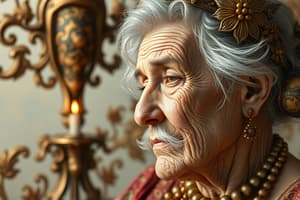Podcast
Questions and Answers
According to the Relief Theory, what is humor?
According to the Relief Theory, what is humor?
Why do we need a release according to the Relief Theory?
Why do we need a release according to the Relief Theory?
What does the passage suggest is necessary in order to appreciate a situation or joke as funny?
What does the passage suggest is necessary in order to appreciate a situation or joke as funny?
Why might a joke or situation evoke sadness instead of laughter?
Why might a joke or situation evoke sadness instead of laughter?
What kind of knowledge might be necessary to understand some jokes according to the passage?
What kind of knowledge might be necessary to understand some jokes according to the passage?
According to the Superiority Theory of humor, why do people laugh at the misfortunes or mistakes of others?
According to the Superiority Theory of humor, why do people laugh at the misfortunes or mistakes of others?
Which theory of humor suggests that a joke becomes funny when there is an unexpected, inappropriate, or illogical situation?
Which theory of humor suggests that a joke becomes funny when there is an unexpected, inappropriate, or illogical situation?
What kind of misfortunes or mistakes often depicted in funny movies and comedy routines align with the Superiority Theory?
What kind of misfortunes or mistakes often depicted in funny movies and comedy routines align with the Superiority Theory?
Why does the man in the joke about the psychiatrist and his brother saying he's a chicken, mention that he needs the eggs?
Why does the man in the joke about the psychiatrist and his brother saying he's a chicken, mention that he needs the eggs?
According to which theory of humor, do jokes become funny when they make people feel superior by laughing at others' misfortunes or mistakes?
According to which theory of humor, do jokes become funny when they make people feel superior by laughing at others' misfortunes or mistakes?
Flashcards are hidden until you start studying
Study Notes
Relief Theory of Humor
- Humor serves as a mechanism for emotional release, allowing individuals to relieve tension and stress.
- A release is necessary to alleviate the build-up of psychological pressure and societal constraints.
- To appreciate humor, understanding the context or underlying concept of the joke is essential.
Emotional Responses to Humor
- Jokes or situations may evoke sadness instead of laughter if they touch on sensitive or painful topics.
- Knowledge of cultural references, social contexts, or shared experiences may be necessary for grasping certain jokes.
Superiority Theory of Humor
- Laughter results from feeling superior when witnessing the misfortunes or mistakes of others.
- This theory highlights how humor can arise from situations where someone else experiences embarrassment or failure.
Characteristics of Jokes and Humor
- Unexpected, inappropriate, or illogical situations are essential for humor according to specific theories.
- Common themes in comedy, such as minor accidents or social faux pas, align with the Superiority Theory.
Specific Example
- In a joke where a man tells a psychiatrist that he believes he is a chicken, his mention of needing eggs emphasizes the absurdity of his belief and adds an unexpected twist.
- The Superiority Theory applies here, as laughter may stem from perceiving the man's delusion as ridiculous.
Studying That Suits You
Use AI to generate personalized quizzes and flashcards to suit your learning preferences.




